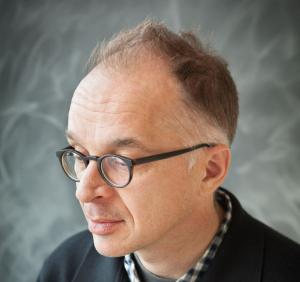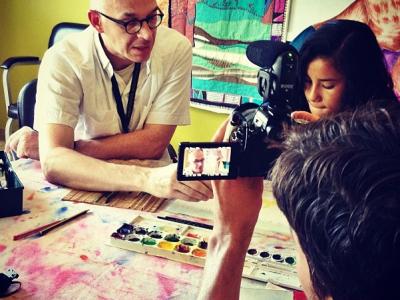When Spencer Reece ’11 M.Div. learned that his second collection of poetry, The Road to Emmaus (Farrar, Straus and Giroux, 2014), had been selected for the National Book Awards Poetry longlist, he was in Spain—a long way from Yale Divinity School, where many of the poems were written.
 For members of the YDS community, Reece’s poems recall familiar scenes: The central character in the poems is a middle-aged man on the road to Episcopal priesthood. In the first poem, “ICU,” the man completes a unit of Clinical Pastoral Education as a chaplain intern in Hartford Hospital. Another poem in the collection, “Upper Room,” describes living in the Berkley Center, “on the third floor of 363 Saint Ronan Street,” where Reece himself spent two of his three years as a YDS student. A third poem mentions the Beinecke Rare Book Library.
For members of the YDS community, Reece’s poems recall familiar scenes: The central character in the poems is a middle-aged man on the road to Episcopal priesthood. In the first poem, “ICU,” the man completes a unit of Clinical Pastoral Education as a chaplain intern in Hartford Hospital. Another poem in the collection, “Upper Room,” describes living in the Berkley Center, “on the third floor of 363 Saint Ronan Street,” where Reece himself spent two of his three years as a YDS student. A third poem mentions the Beinecke Rare Book Library.
When asked about his reaction to Emmaus’ longlisting, Reece responded simply: “I’m honored.”
Publishing a book, Reece explains, is like having a child. “You’re happy for it, but it’s separated from you,” he says. “You would like the world to embrace it because you created it and tried to educate it, but then the minute you get that first box of books, in that very moment, it leaves you.”
“Love poems from the murder capital”
These days, Reece—an Episcopal priest—talks more about Our Little Roses, the girls’ orphanage in Honduras where he recently spent a year teaching poetry on a Fulbright fellowship. According to Reece, it is the only girls’ orphanage in a nation with more than 250,000 orphans.
“The girl child in Honduran culture is not as valued as the male child, which is of course terribly wrong,” says Reece. “Before the orphanage, somebody said, ‘If you open the orphanage, where will we get our maids and prostitutes?’”

Thanks to Our Little Roses, says Reece, some Honduran girls have a different future. But Reece, who now serves in Madrid as assistant to the Bishop of the Reformed Episcopal Church in Spain, wants the girls of Honduras to know that they aren’t forgotten. To this effort, Reece is collecting some of his students’ work into a book, which he describes as “twelve love poems from the murder capital of the world.” Reece also convinced director Brad Coley and executive producer James Franco to make a documentary about the orphanage, now in its final stages of filming and due in late 2015.
“I’d like to see them embraced by the world through these art forms, through the book, and through the film,” says Reece.
For Reece, his work with Our Little Flowers has proved a powerful mix of his twin vocations.
“Poetry has always been something I’ve done on the side or in private,” Reece explains. “The call to bring more attention to the abandoned and abused girls of Honduras brought the poetry and the priesthood together for the first time in a public way. And it was very transformative personally, at the same time.”
Hyphenated vocations
And Reece is not alone. YDS is home to many poets—alumni, faculty, and students—who are finding ways to be ministers of both word and world.
It’s an impressive list: Nate Klug ’13 M.Div., a 2010 recipient of the Ruth Lilly fellowship and author of Rude Woods (Song Cave, 2013), is an ordained UCC pastor. Martha Serpas ’94 M.Div., a trauma chaplain since 2006, will publish her third book of poetry, The Diener (Lousiana State Press, 2015) next year. Both Chard DeNiord ’78 M.Div. and Randall Stiffler ’74 M.A.R. have dual careers as poets and professors. And Marc Harshman ’75 M.A.R., poet laureate of West Virginia and children’s book author, also taught fifth and sixth grade for many years in a three-room schoolhouse.
In addition to his contributions to hymnody, preaching, and worship, Professor Thomas Troeger has also authored several poetry collections. Besides his scholarship on Hebrew poetry, Lector in Biblical Hebrew Eric Raymond has also published some poems of his own—in English. And Senior Lecturer in Religion and Literature Christian Wiman, formerly the editor of the magazine Poetry, published his fourth volume of poetry this fall: Once in the West (Farrar, Straus & Giroux, 2014).
Poetry isn’t profitable and for many poets, dual vocations are a must. Yet economic necessity is not all that leads YDS’s poets to hyphenated vocations. They’re driven by something deeper.
“For me it’s really important that my art is useful to someone,” says Bethany Carlson ’16 M.Div. whose first book of poetry Diadem Me (MIEL, 2014) will be released this fall. Carlson came to YDS with a M.F.A. in poetry from Indiana University but is pursuing an M.Div. “to be able to work with people in the real world.”
“At some point, it starts to feel a little bit shallow,” says Carlson about the emphasis in many writing programs about finding one’s “voice.” Instead, Carlson has other concerns. “Is what I’m writing about sloping inwards towards me and towards glorifying myself or is it actually offering something to someone else?
Win Bassett ’15 M.A.R. whose poetry has appeared in Ruminate, Image, Pea River Journal, and the Yale Daily News, came to YDS primarily for the Educational Leadership and Ministry (ELM) program.
“I know my writing will never my bread-winning career, and I don’t want it to be,” says Bassett, who hopes to pursue a career in independent schools as a teacher, administrator, and coach. “I feel a sense of call to primary and secondary education, and I hope always to have my writing—which I still consider one of my vocations—as a way to feel closer to God and to make sense of all of this.”
Faith, by another name
For Oana S. Marian ’02 B.A. ’16 M.A.R the lines between poetry, faith, career, and vocation increasingly blur.
Following her graduation from Yale College, Marian earned an M.F.A. in poetry from John Hopkins. Since then, she’s worked as a translator, photographer, and filmmaker and lived England, New York, Los Angeles, and her native Romania. Her translation of Romanian novelist Norman Mena’s The Lair (Yale University Press, 2012) was longlisted by Three Percent for their 2013 Best Translated Book in Fiction.
Through it all, Marian says poetry has been an “overarching, guiding aesthetic” to her life. Yet her writing classes at YDS have made Marian wonder: “Have I actually been thinking about faith the whole time and calling it poetry?” she asks.
It’s a question echoed by Mark Koyama ’15 M.Div., a UCC member in discernment.
“I think poetry, in some ways, is a mode of communication that’s well-suited to working with the ineffable because it’s intentionally polyvalent,” says Koyama who holds an M.F.A. in fiction from University of Massachusetts Amherst and is editor of Letters, a literary journal produced by the students of YDS and ISM.
When writing poetry, he continues, “you’re not beholden to any logic at all except the capricious logic of your heart…and maybe God as well.”
He pauses. “Or maybe those two are the same thing. Who knows?” ♦
Many of the books mentioned here, including Reece’s The Road to Emmaus, are available in the Yale Divinity School Student Book Supply.
| Attachment | Size |
|---|---|
| 82.65 KB | |
| 110.78 KB |